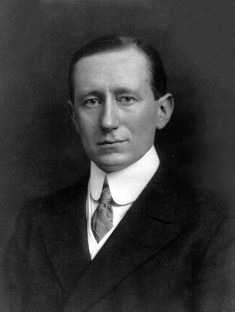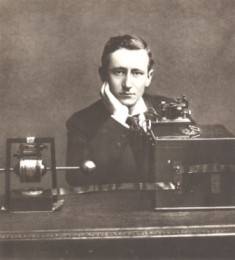| Guglielmo Marconi | |
|---|---|
 |
|
| Inventor | |
| Specialty | Radio transmission |
| Born | Apr. 25, 1874 Palazzo Marescalchi, Bologna, Italy |
| Died | July 20, 1937 (at age 63) Rome, Italy |
| Nationality | Italian |
Guglielmo Marconi was famous Italian inventor. He is best known for his pioneering work on the long-distance radio transmission. He is also famous for his contributions in the development of Marconi’s law and the radio telegraph system. Today, he is often credited as the inventor of the radio. In 1909, he shared his Noble Prize in Physics with fellow physicist Karl Braun. The prize was in recognition to their great works in development of the wireless telegraphy.
Early Life
Marconi was born on April 25, 1874, in Bologna. He was the second son of an Italian landowner. He was at first educated privately in Bologna. As child, he had great interests in electricity and science. One of his early scientific developments was influenced by Heinrich Hertz.
In 1888, Hertz demonstrated that a person could produce and even detect electromagnetic radiation (now known as radio waves). After Hertz’s death in 1894, many reviews of his discoveries were published and this renewed a great interest on Marconi. He joined the University of Bologna and was permitted to study the subject under Augusto Righi, a physicist and a good friend of Marconi.
Marconi’s Career
Marconi was very convinced that the communication among people could be made possible through wireless radio signaling. In 1895, he started conducting his experiments at his dad’s home in Pontecchio. Here, he sent different signals over a distance of more than one mile. During that time, Marconi carried out experiments with the help of reflectors around an aerial. He used this to concentrate radiated electrical energy into a beam rather than spreading the energy in all directions.
The next year, Guglielmo Marconi went to England to get a patent for his own apparatus. In this year, he was given world’s first patent for a system of wireless telegraphy. In London, he successfully demonstrated that the system had the ability to transmit the radio signals. He did this on the Salisbury Plain and across the Bristol Channel. In 1897, he formed his Wireless Telegraph and Signal Company. This company was later renamed to Marconi’s Wireless Telegraph Company in 1890.
Expanding Wireless Telegraphy
 In 1899, Marconi was able to establish a wireless link between France and Britain across the English Channel. He went ahead to further establish permanent wireless stations at the Isle of Wright, The Needles, Bournemouth and Haven Hotel in Poole. After one year, he finally got his patent for tuned or systonic telegraphy.
In 1899, Marconi was able to establish a wireless link between France and Britain across the English Channel. He went ahead to further establish permanent wireless stations at the Isle of Wright, The Needles, Bournemouth and Haven Hotel in Poole. After one year, he finally got his patent for tuned or systonic telegraphy.
In December of 1901, Marconi proved that a wireless signal was not affected by the earth’s curvature. He did this by transmitting the very first wireless signals just across the Atlantic. This was between Poldhu, Cornwall, and the St. Johns, New Foundation. The total distance was about 2100 miles.
In 1902, he demonstrated daylight effect relative to the wireless communication. He also patented his own magnetic detector which was used as the actual standard wireless receiver for a very long time. In December of the same year, he was actually able to successfully transmit the first complete massage to Poldhu. The messages were from different stations at Glace Bay, Cape Cod, Massachusetts, and Nova Scotia.
Personal Life
On March 16, 1905, Marconi married Beatrice. Together, they had three children. In 1924, the couple divorced and he married Maria three years later. They later had one daughter. He left his entire fortune to his second wife and child, leaving nothing to the children in his first marriage.
Marconi’s Later Years
In 1914, Marconi became a senator in the Italian Senate. During the First World War, Italy joined the Allied side and Marconi was left in charge of the country’s military radio service. After a while, he became a lieutenant in the Italian Army. In 1923, he joined a party called Italian Fascist party. In 1931, he personally wanted to introduce the very first radio broadcast of a pope, Pius XI.
Gugliemo Marconi died on July 20, 1937. He was only 53 years and the cause of his death was series of heart problems. His country held a state funeral for him. As a tribute, all the radio stations in all countries worldwide observed two minutes of silence.